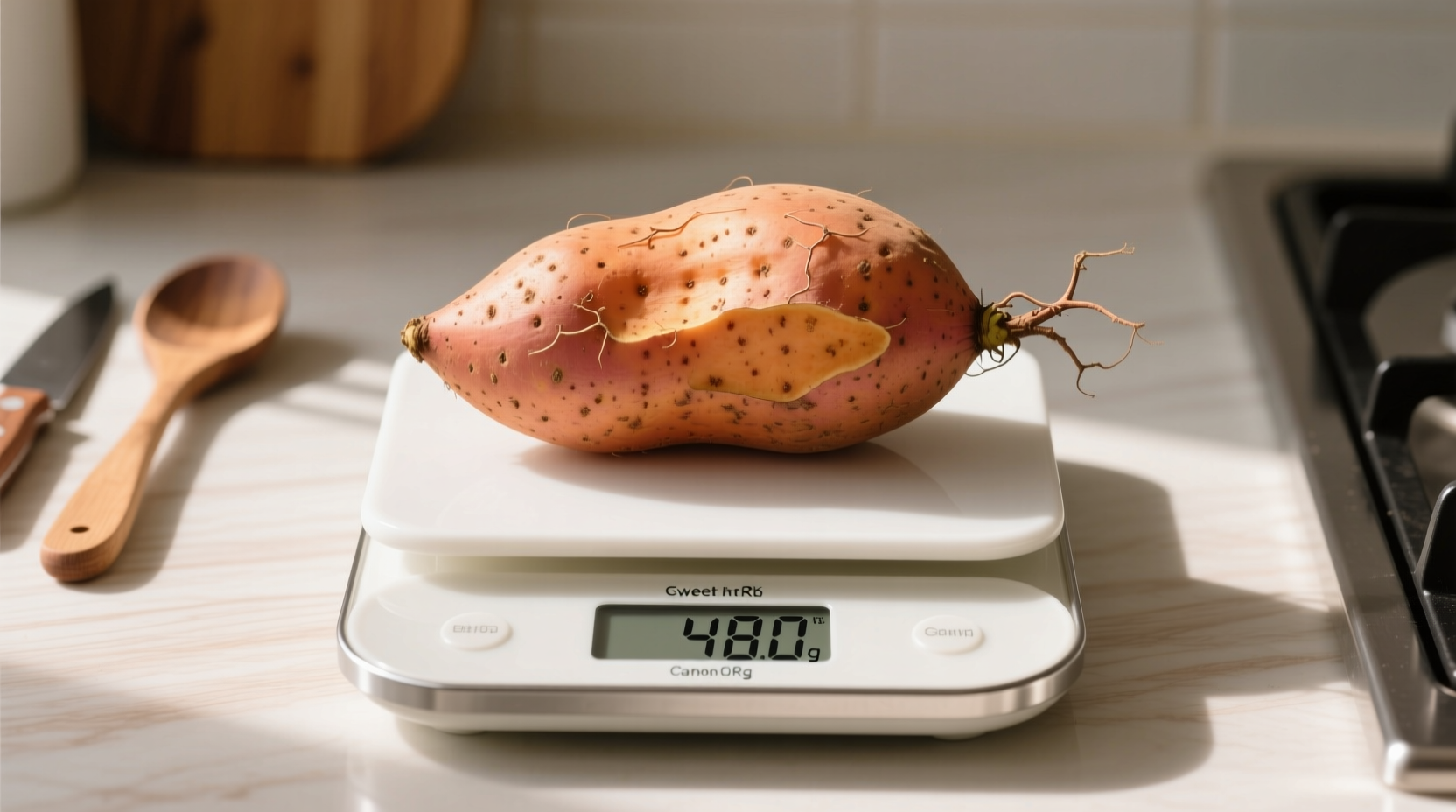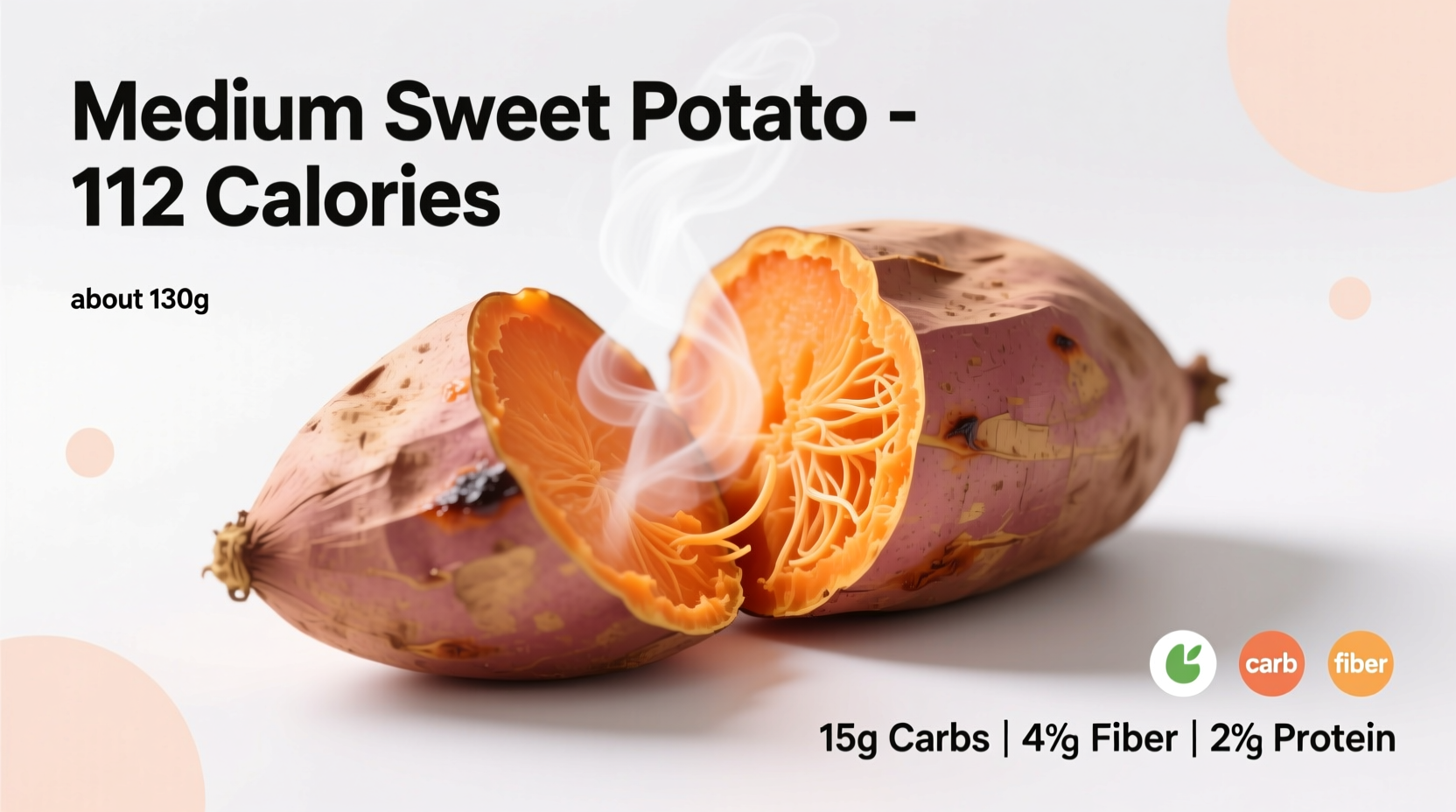Understanding the exact calorie content of common foods is essential for effective nutrition tracking and meal planning. Whether you're managing dietary goals, counting macros, or simply making informed food choices, having accurate data about staple foods like sweet potatoes helps you maintain control over your nutritional intake without sacrificing flavor or satisfaction.
Why Calorie Accuracy Matters for Sweet Potatoes
Sweet potatoes frequently appear in balanced meal plans due to their nutrient density and versatility. However, portion size significantly impacts calorie count. Many people mistakenly assume all sweet potatoes contain the same calories, but size variations create substantial differences in nutritional content. A medium sweet potato represents the standard portion used in most dietary guidelines and nutrition tracking apps.
Complete Nutritional Profile of a Medium Sweet Potato
Beyond calories, sweet potatoes offer impressive nutritional benefits that make them a valuable addition to most diets. Here's the complete breakdown for a 130g medium sweet potato with skin:
| Nutrient | Amount | % Daily Value* |
|---|---|---|
| Calories | 112 | 6% |
| Total Fat | 0.1g | 0% |
| Carbohydrates | 26.7g | 10% |
| Dietary Fiber | 3.8g | 14% |
| Sugars | 5.7g | - |
| Protein | 2.0g | 4% |
| Vitamin A | 21,907 IU | 438% |
| Vitamin C | 22.3mg | 25% |
| Potassium | 438mg | 13% |
*Percent Daily Values are based on a 2,000 calorie diet. Your daily values may be higher or lower depending on your calorie needs.
This nutritional powerhouse delivers more than 400% of your daily vitamin A requirement, primarily as beta-carotene, which your body converts to vitamin A as needed. Unlike some vitamin supplements, this natural form doesn't carry risk of toxicity.
How Sweet Potato Size Affects Calorie Count
Understanding size variations is crucial for accurate tracking. The USDA defines a medium sweet potato as approximately 5 inches long and 2 inches in diameter, weighing about 130 grams (4.6 ounces). Here's how different sizes impact calorie content:
- Small sweet potato (80g): Approximately 68 calories
- Medium sweet potato (130g): 112 calories
- Large sweet potato (180g): Approximately 154 calories
- Extra-large sweet potato (250g): Approximately 213 calories
When tracking calories, always consider whether your sweet potato matches the "medium" standard. Most grocery stores sell sweet potatoes in varying sizes, so weighing your portion provides the most accurate count.

Context Boundaries: When This Information Applies
While the 112-calorie figure applies to a plain, baked medium sweet potato with skin, preparation methods significantly alter the nutritional profile:
- Boiled sweet potato: Contains the same 112 calories but may have slightly lower vitamin retention
- Microwaved sweet potato: Maintains similar calorie count with minimal nutrient loss
- Sweet potato fries (1 medium): Can range from 140-250 calories depending on oil absorption
- Marshmallow-topped sweet potato: Easily exceeds 300 calories with added sugar and fat
The USDA data reflects plain preparation without added fats or sugars. For accurate tracking, account for any cooking oils, toppings, or preparation methods that add calories.
Evolution of Sweet Potato Nutrition Understanding
Nutritional science around sweet potatoes has evolved significantly over the past two decades. Early research primarily focused on carbohydrate content, but recent studies highlight their complex nutritional benefits:
- 2005-2010: Research established sweet potatoes as excellent sources of beta-carotene, with orange varieties containing up to 10 times more than white potatoes
- 2011-2015: Studies revealed the glycemic impact of sweet potatoes is lower than previously thought when consumed with skin
- 2016-2020: Research demonstrated how specific cooking methods preserve more nutrients than others
- 2021-Present: Current understanding recognizes sweet potatoes as functional foods with anti-inflammatory properties beyond basic nutrition
This evolving research explains why modern nutritional databases like USDA FoodData Central provide more comprehensive information than older references. The current 112-calorie figure for a medium sweet potato reflects the most up-to-date analytical methods and portion standards.
Practical Applications for Your Diet
Knowing the precise calorie content helps you incorporate sweet potatoes strategically into various dietary approaches:
- Weight management: Substitute a medium sweet potato (112 calories) for higher-calorie carbohydrate sources like white rice (205 calories per cup)
- Post-workout nutrition: Pair with protein sources for optimal recovery within a 300-400 calorie meal
- Meal prep: Roast multiple medium sweet potatoes at once for ready-to-eat portions throughout the week
- Portion control: Use the medium size (5 inches long) as your visual reference for accurate tracking
Registered dietitians frequently recommend sweet potatoes as a nutrient-dense carbohydrate option that provides sustained energy without dramatic blood sugar spikes when consumed with protein and healthy fats.
Comparing Sweet Potatoes to Other Common Foods
Understanding how sweet potatoes fit into your overall nutrition requires comparison with other staple foods:
| Food (per 130g) | Calories | Carbohydrates | Fiber | Protein |
|---|---|---|---|---|
| Medium sweet potato | 112 | 26.7g | 3.8g | 2.0g |
| White potato | 110 | 25.6g | 2.2g | 2.5g |
| Quinoa (cooked) | 166 | 31.2g | 2.6g | 5.6g |
| Brown rice (cooked) | 165 | 35.0g | 1.8g | 3.5g |
| Whole wheat bread (2 slices) | 140 | 24.0g | 3.0g | 5.0g |
While calorie counts are similar to white potatoes, sweet potatoes provide significantly more fiber and vitamin A. This makes them a more nutrient-dense option for most dietary patterns.
Health Benefits Beyond Calories
The value of sweet potatoes extends far beyond their calorie count. Research published in the American Journal of Clinical Nutrition highlights several evidence-based benefits:
- Rich in antioxidants: Orange sweet potatoes contain high levels of beta-carotene, while purple varieties offer anthocyanins
- Blood sugar management: The fiber content helps moderate glucose absorption compared to refined carbohydrates
- Digestive health: The 3.8g of fiber supports healthy gut bacteria and regularity
- Immune support: Exceptional vitamin A content strengthens mucosal barriers and immune function
These benefits make sweet potatoes a functional food that contributes to overall health beyond basic nutrition metrics.
Common Questions About Sweet Potato Nutrition
Based on frequent inquiries from nutrition tracking communities, here are answers to the most common questions about sweet potato calories and nutrition:











 浙公网安备
33010002000092号
浙公网安备
33010002000092号 浙B2-20120091-4
浙B2-20120091-4